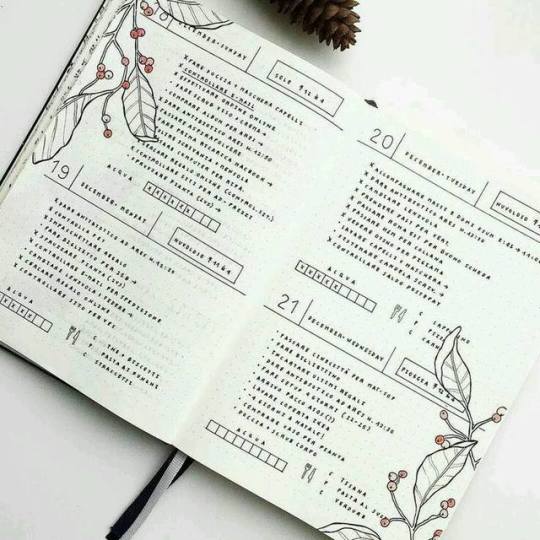Photo

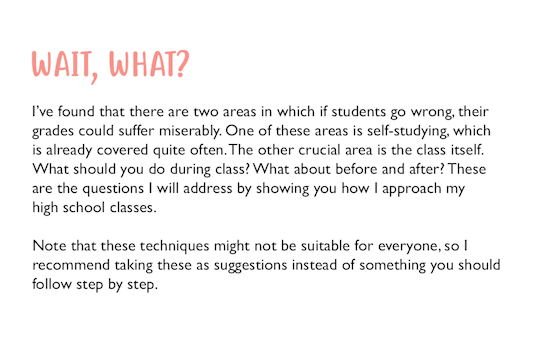
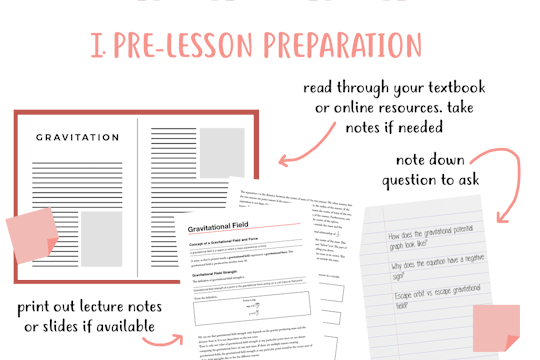
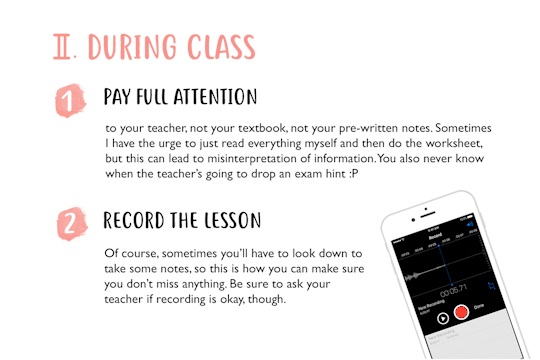
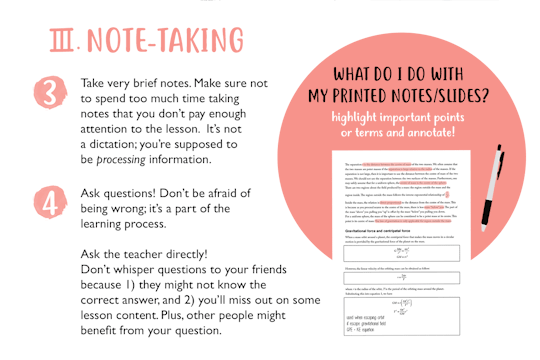
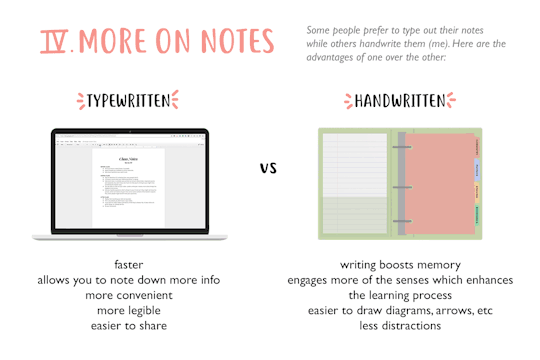

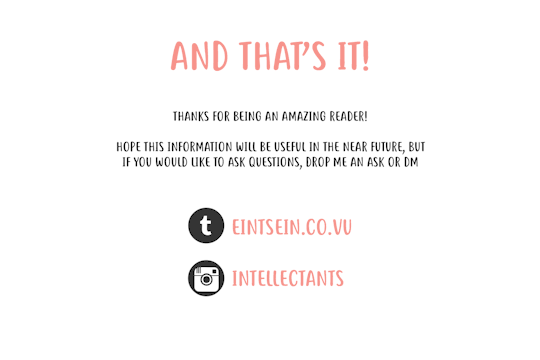
HOW TO APPROACH CLASSES A guide to getting the most out of your classes and lectures
By Eintsein
Design inspired by this post by @journalsanctuary
37K notes
·
View notes
Photo




01-09-17 Gametogenesis, Spermatogenesis & Oogenesis notes for my Developmental Biology! We’ve tackled it way back our Biology 1, how lovely i forgot most of them. 😅 We will have a test ‘bout this topic so i really need to study. Have a wonderful day everyone! ❁*:・゚✧❁
ps. So touched with those studyblrs who keep on messaging me, i love you all! ˚₊*(ˊॢo̶̶̷̤◡ुo̴̶̷̤ˋॢ)*₊˚⁎
2K notes
·
View notes
Text
How I Got Straight A’s in My First Year of University
I was so proud of myself when I received firsts (that’s A’s for those not attending uni in the UK) on all of my assessments in my first year at university. Here are some tips for y’all to try at any point in university. They may be specific at times to my experience—my degree is in the social sciences and humanities, and I’m studying in the UK—but I did try to make them more generally applicable, and hopefully they should be helpful to someone out there.
Part One: Everyday Study Routine
Before the start of the academic year, try to get in a little bit of preparation. See if there are any syllabi or reading lists posted online. You don’t have to pour over them, of course, but do attempt to do something, and have a basic grasp on what will be covered in your classes.
Go to all your lectures and seminars. Unless you absolutely have to miss class because you are ill or have an important obligation to take care of, it’s really important to attend your lectures every day. (Note: if you are struggling with mental or chronic illness or a disability, don’t beat yourself up if you keep missing class. Please take care of yourself.) You may be tempted to just look at the PowerPoint presentation online, but it’s much more effective to be there in person. Often the lecturer may include information or extra explanations which are not included in the presentation. It will also allow you to process the information aurally as well as visually, and you will have the added benefit of taking notes too. You may also be able to ask questions.
Do all the pre-reading for lectures. I know it’s tempting to put it off, but try to work it into your daily routine (because you will have reading to do every day). Inevitably, there will be times where you slip up and don’t have time to finish. If this happens, make sure you catch up on it at some point, because it’s very important to solidifying the concepts you are learning about. Also, the more you read in general, the better you will become at reading (and also writing).
Take diligent notes (for both your lectures and pre-reading), and keep them organized. I prefer to handwrite in a notebook, as it helps me synthesize information rather than just typing it out verbatim—but it is totally up to you. If you do use a notebook, make a table of contents on the first page, where you write the date, topic, class, and page numbers of each set of notes you take. I think it’s a great idea to include your own thoughts and opinions in notes, or linking concepts you are learning to concepts you already know about.
If you have the time, make sure to be reading books/essays/articles and engaging with ideas outside of your regular syllabus. This is one of the most important techniques (in my experience, at least) when it comes to writing essays and answering exam questions. Evidence of wider reading around a topic is a great way to boost the credibility of your argument. It also does wonders to solidify and broaden your conceptualization of certain ideas you may have covered in your classes.
Where possible, try to contribute (as much as you feel comfortable) in seminars. If you are very quiet and reserved, that is totally okay too. I’m with you. But it has helped me tremendously in the past year to push myself to speak up more often in seminars. Talking in seminars allows you to clarify concepts and engage more deeply with the material being discussed (and it might impress your seminar tutor too, though this is secondary to the learning in my opinion).
If you have some nerdy-ass friends, talk with them about your ideas and what you’re both learning in your courses. I can’t tell you the number of essays I’ve written which actually have blossomed out of conversations I’ve had with friends, where they’ve exposed me to topics I’d never heard of before or broadened my view of a concept. Learning from each other in a casual and fun setting is amazing!
Part Two: Assessment Time
When you are given notice about big assignments coming up, such as essays or group projects, try to start working on them ASAP. Trust me, I know how hard it is. This is coming from someone who has dealt for years with chronic procrastination issues and nearly didn’t graduate from high school because of it. But you must start planning as soon as you possibly can, because the due date will come screaming up and before you know it, it’ll be the night before the deadline and you won’t have a clue what you’re writing about. Work it into your daily schedule if you have to. One great tip is to write down the deadline as being earlier (say, a week earlier) than what it actually is. This will prompt you to start earlier than you normally would have.
Do a shitload of reading, widely, from multiple sources. Read everything you can on the topic you are doing your assignment on. For a basic literature review, this means looking through at least 20+ sources. That doesn’t mean carefully perusing each one front to back; it means looking through all the relevant literature to find a few great sources which will really give you a coherent argument and a big picture of the topic at hand.
Keep your sources organized. I use Paperpile, which is a Chrome extension that allows you to save and organize academic sources. I make a folder for each assessment I am working on, and anything I find relevant to my topic, I save it to the folder. This will be a life saver for you when you actually go to plan your paper and also do the referencing.
Content is important, but perhaps even more important is your argument and structure. This mostly applies to essays, but you can apply it to other types of assessments too. Try not to structure your argument in terms of blocks of content—e.g. Paragraph 1 is about Topic A, Paragraph 2 is about Topic B—but rather in terms of how you are laying out your argument. Make sure each part of your essay flows into the next, so that you are, for example, setting up a kind of dialogue or narrative between the different sources you’re using. Also ensure that any point you are making clearly relates back to your main thesis.
If you’re a perfectionist like me: train yourself to remember that there is no such thing as perfect. Try to imagine what the perfect essay would be like. Can you imagine it? It’s probably pretty difficult, right? That’s because there is no such thing as a perfect assignment. Remind yourself of this, constantly. Tell yourself that you will be okay with just doing your very best. If you think about it logically: handing in something that is perhaps not your best ever, but handing it in on time and doing pretty well, is infinitely better than attempting to have a “perfect” essay but handing it in late and failing the assignment.
I hope this helped some of you! Best of luck and happy studying this year—go knock ‘em out! xo
10K notes
·
View notes
Photo

The ultimate packing list if you are going to study abroad this year
For many of us, the new school year/semester is coming very fast and very soon. For some of us, a new education year is nothing special - you just have to set the alarm clock back into ‘I have got to get up early’ mode and go to school, college, university or however you want to call it.
However, for some of us starting a new year means more. It is related to moving out of home sometimes into a new city or even into a new country. This is related to getting familiar in a new surrounding and starting a new life where you don’t know where to find the best coffee in town, how to ride the bus or how to speak the language (cheers to all langblrs out there ;) ).
For all of you who belong to the second type of people, I dedicate today’s post. Organizing all the things that are related to such a move and saying goodbye to all your loved ones needs enough energy. You should not spend your time thinking about all the items that you need to pack for the big journey. And for this reason, I provide you with the ultimate packing list if you are going to study abroad this year. If you’re missing something that you would never leave at home reblog this post and add your most important travel gadget/item!
With that being said, travel safely and pack wisely ;)
- - - - - - - - - - - - - - - - - - - - - - - -
Bathroom
Bath towels
Brush
Face wash
First-aid kit
Flip-flops (in case you have to share your bathroom)
Floss
Hair straightener (no hairdryer, buy it at your destination)
Hand towels
Makeup (eyeliner, mascara, foundation, blush etc.)
Makeup remover
Nail products (nail polish, clippers, file)
Patches
Pain medication
Razor
Thermometer
Toothbrush
Toothpaste
Travel-sized shampoo, lotion, deodorant)
Bedroom
Alarm clock
Blanket
Decoration (e.g. pictures of your friends and family)
Earplugs
Favorite pillow
Mattress pad
Pillowcases
Sleeping mask
Electronics
All of your chargers
Batteries
Calculator
Extension leads
Headphones
Laptop
Smartphone
USB stick
Kitchen (buy this stuff at your destination)
Favorite candy from home
Kitchen scale
Misc
Bujo or a traveller’s journal
Driver’s licence
Extra bags
Financial aid information
Important addresses
Luggage tags with your contact details
Medical insurance card
Passport
Passport photos
Travel details & confirmation
Travel tickets
Visa
Water bottle
Wallet (Cash, coins and credit card)
Outdoor
Coat
Gloves
Hat
Jacket
Scarf
Sunglasses
Sun protection
Umbrella
Water-resistant boots
Water-resistant jacket
Wardrobe
Accessories (few, please!)
Bottoms
Blazer
Dress
Hoodie
Jeans
Pajamas
Shoes
Skirt
Socks
Sportswear and athletic shoes
Sweaters
Sweat pants
Tops
Undergarments
Extra tips
Before you overload all of your bags contact your university and try to find out which of the items they will provide. Perhaps there is something like a starter kit they offer so you do not have to carry bulky bed or kitchen items with you.
Take only your favorite clothes with you. But there is this fancy dress that you own that one day could look so cool? Leave it at home. You won’t wear it. Period.
Don’t take things with you that can be easily bought after your arrival. This includes hair dryers, kettles, flat irons, big bags, stationery, kitchen items etc.
In case you want to travel with additional luggage ask your airline before your departure date regarding their conditions. There are airlines that offer an online check-in for your additional luggage or a pre registration. If you take advantage of such offers you can save a few coins.
Don’t forget to make a (digital) copy of your most important documents and cards!
4K notes
·
View notes
Photo

“Productivity is about making smart choices (continuously) with your energy, focus and time in order to maximise your potential and achieve beneficial results.” – Mohammed Faris
1. Find your energy hours.
Everyone has a specific time in the day where their energy levels are much higher than usual. Use that time to your advantage. Take that energy and get the majority of your work done and out of the way.
For me, the mornings are usually when I feel the most energised, so I get to work straight away. To find your energy hours, try working at different times during the day. See which time of the day allows you to work at your very best.
2. Establish routines.
Once you have found your energy hours, base your day around this. Create a routine for each day of the week.
When do you study? When do you go to school? Do you relax for an hour after coming back from school? Do you tidy your room on Sunday?
Establish a schedule and you’re less likely to get side-tracked and much more likely to maximise your productivity.
3. Ditch the to-do lists.
Yes, it’s good to write lists of things you need to do, but you’re never going to get around to doing them if you don’t plan time for it. So instead of relying on a to-do list, add the task to your routine. Will you be able to work on this task on a Saturday afternoon? Great! Put it into your schedule. This will ensure the task is completed.
4. Don’t multi-task.
You can’t do multiple things at once. It seems like you’re able to, but what you’re really doing is constantly switching your attention from one task to another. Don’t do that. Focus on one thing at a time. That way, you’re putting all of your attention on a task and are likely to get it completed faster and at a higher standard.
5. Complete similar tasks together.
If you’re studying, instead of switching from subject to subject throughout the day, try to stick to one subject. On Monday, create flashcards for a Biology topic, then revise the topic and then do a Biology past paper. This will ensure your mind is concentrated on one thing at a time and not constantly switching gears.
So get your chores done together. Study one subject at a time. Send your e-mails and messages at one time. Dedicate today to your English essay. Don’t interrupt tasks with an unrelated task.
6. Finish quick and easy tasks first.
If you need to make a dentist appointment, do it. Do you need to write a quick e-mail to your teacher? Get it out of the way.
Finishing the quick and easy tasks right away will leave you with ample time to tackle the more challenging ones you’ve got up ahead. It will also give you peace of mind that you’ve gotten something done today.
7. Take breaks.
You’re not a machine. Productivity is not working 24/7.
“Being productive is about knowing when to have fun and when to work hard; when to relax and when to be serious. It’s about making smart choices.”
Allow your mind and body to take a break every now and then and relax. Scheduling these breaks can be beneficial so that you’re not constantly taking a break when you don’t need to.
8. Prioritise.
Yes, that idea you had on the train was appealing, but is it really that beneficial? Is it important enough for you to spend your valuable time and energy on it? Will it get you where you want to go? Probably not.
So prioritise projects and tasks. Ensure important tasks are completed first and well before any upcoming deadlines. Make sure that your time is better spent doing things that will actually benefit you and bring you closer to your goals.
9. Become accountable to someone.
It’s super easy to make promises to yourself, saying that you will do this and do that. Likewise, it’s also extremely easy to break those promises.
However, this is different when you have someone you are accountable to. Perhaps, at the end of every week, you can report to a parent or a trusted friend on your progress so far. It’s extremely difficult to tell someone that you haven’t accomplished your goals for the week. This will make it far more likely for you to get your work done.
10. Review your progress.
At the end of each day, you should evaluate your progress. What did you accomplish today? What did you do well? What did you not complete today? Why? How could you improve? When will you complete it?
Asking yourself these questions and being honest will help you see where you’re going right and where you’re not doing so well.
I hope this is useful to some of you and that you put your time and energy into good use. 😊

6K notes
·
View notes
Photo

As mentioned on my meal plan post, recipe finding can take up a lot of time so I’ve grouped up some yummy lunch ideas for you!! /ᐠ.ᆽ.ᐟ \
Pasta/Noodles:
cheese tomato alfredo bake
beef broth udon
teriyaki chicken with zucchini noodles
baked ziti
creamy spinach alfredo pasta
mac & cheese
lemon basil pasta
mushroom + soba noodles
lemon garlic shrimp pasta
4 ways to make penne
Rice:
chicken / spam sushi
bacon egg fried rice
pineapple fried rice
sriracha mayo chicken rice balls
Others:
tortilla wrap ‘sushi’ roll
cucumber ham rollups
spinach + feta cheese savoury muffins
cheddar corn fritters
cheesy potato bacon bake
chicken mozzarella sticks
shrimp avocado plantain cups
zucchini tots
Vegan:
Liv’s Healthy Life - 1 / 2 / 3
sweet potato brownies
thai basil noodles
fried brown rice + bell peppers & red beans
roasted pepper oregano pasta
brown rice pasta + sweet potato sauce w/ basil
brown rice + mushroom & kale
18K notes
·
View notes
Photo

Handwriting tag!!
Here is a sample of my handwriting - I thought fitting for my second post. I am trying to get into writing in a more cursive style because I think it is far more elegant but I usually write in print. (P.S. please ignore the weird paper)
0 notes
Photo
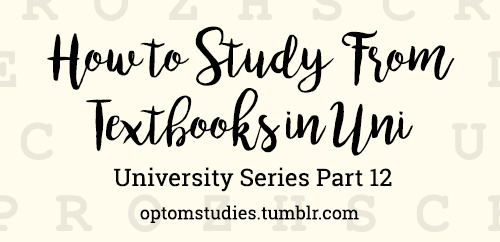
#optomstudies talking about using textbooks 📚📚📚! @slowtownstudies Unlike high school, teachers won’t usually assign specific pages or problem sets to do, and you’ll be using it as a supplement to your studies. There’s no one way of using textbooks because there are multiple types.
Quick reference type
Characteristics: Usually pocket or A5 sized, bit hard to understand without having background knowledge first, basic dot point summaries. E.g. Wills Eye Manual and Kanski Clinical Ophthalmology Synopsis.
Benefits of this type of txtbk: good for things you can forget easily, great to revise with before exams, doesn’t break your back to carry around.
How to make notes: you don’t. Just read straight off them - they are quick reference and require you to understand concepts first.
Explanatory type
Characteristics: thick, typically 2-3 inches in thickness, written in easy to understand language, as wordy and comprehensive as a print text can be whilst still being able to be carried home out of a bookshop, updated but usually not much difference between versions E.g. Campbell’s Biology.
Benefits of this type of txtbk: can be studied from without attending lectures, easily readable even when university has sucked the life energy out of you, so comprehensive your lecture usually uses it as the basis of their lecture notes.
How to make notes:
Make your lecture summaries first
Get a good grasp of topic
Read textbook and jot down notes or write down on a post-it anything you didn’t already know/needed clarified/anything the textbook explained better.
Use active reading and make sure you try and word it in your own way!
Add these post-its into your lecture summary notes
Springboard/Basics type
Characteristics: typically 1-2 inches thick, author will specifically say in their Preface that the book is intended to cover the basics, is updated regularly every few years often with overhauls of content. E.g. Kanski’s Clinical Ophthalmology.
How to make notes: Similar to Explanatory type, but since it’s written more in a dot-point fashion, you’ll find it to be similar in format to your lecture notes. Judge on a case-by-case basis whether or not you want to make notes.
MY WEEKLY STUDY TIPS
It’s too long to list everything so please see all original posts here, stationery here, bullet journal spreads here, and my study tips directory (web) :)
WHAT I WISH I’D KNOWN BEFORE UNIVERSITY STUDY TIPS SERIES
0 , 1 , 2 , 3 , 4 , 5 , 6 , 7 , 8 , 9 , 10-1 , 10-2 Saving Money
11 Adapting to Uni Study new!!
12 How to Study From Textbooks in Uni coming 27.02.17!
SEE ALSO Selected Tips/From This Month
Time Management and Organisation
Overcoming the Planning Fallacy new!!
Study Spaces Masterpost , Great Laptop Options for Students , Catching Up with Your Studies
Printables: Weekly Planner with Extra Space for Sat/Sun
Self-Care/Other: Dealing with Bad Teachers , Bujo Maintenance , Sleeping and Waking Up Early
Subject Specific Tips: HSC English, Biology
My langblr vocab lists: 봄날 - BTS + Rookie - RV + more!
2K notes
·
View notes
Text
Note Taking Tips
Hello! Sorry for the lack of original content lately… Extracurriculars amirite? Okay, so it’s been about a week into my last quarter of my freshman year, and man, the amount of notes/planning I’ve had to take this week have made hand cramps a daily inconvenience. Anyway, here are some tips I have on taking different kinds of notes!
Skeleton Notes
Okay, so skeleton notes are those little packets teachers hand out with most of the information already there. All you have to do is fill in the blanks.
1. Pay attention
Okay my dudes, I know that everyone is guilty of zoning out and not paying attention while the teacher is droning on, and just pausing to fill in the blanks. (Especially me whoops) Honestly, paying attention to your teacher, (even while they’re going off on some random story you don’t care about) can be the difference between an A and a B.
2. Highlight
Okay, you should really be highlighting all your notes (for easier studying + aesthetic) but highlighting skeleton notes just makes it easier for you to pick out what is really important in the entire packet, and should cut down your studying time a ton.
Not going to lie, there’s really not that much you can do for skeleton notes. All you can do is make sure you fill in all the blanks, and that you pay attention to whatever the teacher may be saying.
Lecture Notes
Okay, there is truly NOTHING I hate more than having to take notes while a teacher is lecturing. I hate not being able to see what I’m working on, and the fact that I’m relying on someone else to tell me EVERYTHING I need to know about a subject. Alas, they still exist, so here are some tips.
1. Don’t try to write everything down
Depending on how fast your teacher talks, no matter what, it’s going to be difficult to write EVERYTHING that the teacher says. Instead, quickly summarize, and try to keep along with the flow of what your teacher says, rather than writing every minuscule detail of what the teacher says.
2. Make friends in the class
Even if you’re as antisocial as me (long long stories of horrible awkward silence), try to make friends in the class!! That way, you guys can compare notes and find out what each person thought was really important.
3. Rewrite your notes out
Let’s face it, when someone’s lecturing, you’re trying to move your hand as fast as the words come out of your teacher’s mouth. You’re not carefully thinking about what you might need to study/review later. By rewriting your notes out, it just helps cement what you did learn in the lecture, and what you might need to study later for the test.
Freehand Notes
Freehand notes are actually my favorite notes. The teacher normally just throws on a powerpoint, or hands you a packet, and you have to write down whatever you deem important enough to study for later.
1. Organize accordingly
The easiest way (at least for me) to set up freehand notes is to have a small header to place each piece of information. Keeping organized with any notes is obviously important, but since you’re the one most likely to be looking at your own freehand notes, it’s extremely important with freehand.
2. Color-code like your life depends on it
Again, (kind of an obvious one) but, even if you’re color-coding with all the rest of your notes, it’s so much more important with freehand notes. You want to make sure you have a set system for everything you do in freehand, so it’s easier to study and review later.
Check out another good post on how to take notes here by @textbookellie
Good luck! (Sorry if this was difficult to read/understand…)
209 notes
·
View notes
Text
Life-Hack
google search any topic followed by ‘filetype:ppt’ and only powerpoints will come up, or a textbook or subject name followed by ‘filetype:pdf’ to find free textbooks in pdf form
55K notes
·
View notes
Photo







Just in case you need a fresh look for your new tabs page!
Leoh Momentum Lanes Tabby Cat Tabbie Earth View
Reply with your favourite or other great options I didn’t include :D
7K notes
·
View notes
Photo

Hey guys! I am new to the studyblr community - well I have had a blog for some time but I haven’t really posted anything of my own. I am about to (hopefully) start at university in September as a fresher studying psychology, so this seemed like a good time.
5 things about me:
1. I am 18 years old and am from the UK (London to be specific) and have just finished secondary school.
2. I have suffered with fairly severe anxiety for about 2 years now, particularly when it comes to social situations and claustraphobic places (e.g. an exam hall :( )
3. I did Psychology, Biology and Classical Civilisation for my A2 and dropped History at AS
4. I really want to learn a language at least semi-fluently
5. My guilty pleasure is looking at (and falling in love with) other people’s handwriting
Blogs that inspire me on the daily:
I have fallen in love with so many blogs but these one’s have a special place in my heart (because they are just beautiful) @juniorincollege @studyingnectar @equaticns @kerrystudies @stvdybuddies @vestiblr @sfstudy @studywithmariana @etudiez @emmastudies
8 notes
·
View notes
Photo


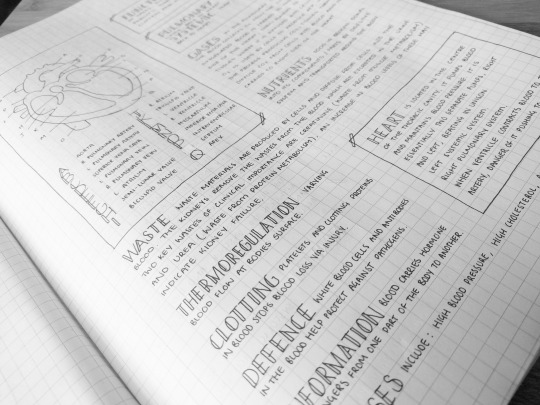
14.09.16 • 13:51PM revising the entire of last year before second year starts.
5K notes
·
View notes
Photo
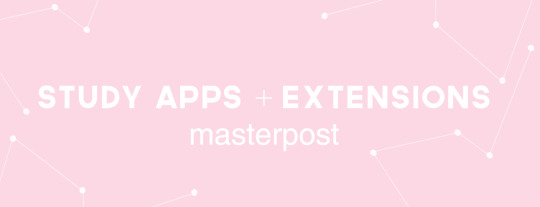
A compilation of chrome extensions and iOS + Android apps (some are paid and some are free) °☆.。.:*・°☆
| For your computer |
fliqlo
momentum
lanes
clarity
embark
minimal clock
infinity
currently
polar clock
caffeine
f.lux
be limitless
leoh
dream afar
| For your note taking |
evernote
onenote
simplenote
somnote
iNotes
notability
notes plus
google keep
quip
inkflow visual notebook
jot
good notes
noteshelf
| For your to-do lists |
wunderlist
moo.do
todoist
habitica
trello
any.do
priority matrix
do
glass planner
swipes
timetune
| For your planners + calendars |
myStudyLife
myHomework
sunrise calendar
google calendar
plan
sol calendar
| For your timing + focus |
tide
forest
pomotodo
flat tomato
pomello
pomodrone
clearfocus
tomato timer
30/30
focusnow
tasks and measures
self control
stayfocusd
timewarp
cold turkey
atimelogger
writer’s block
| For your presentations |
prezi
powerpoint
emaze
raw shorts
powtoon
| For your storage |
google drive
dropbox
| For your mindmaps + diagrams |
mindmeister
lucidchart
goconqr
gliffy
google drawings
| For your tests + flashcards |
goconqr
quizlet
flashcards+
anki
| For your writings |
zotero
grammarly
hemingway
| For your health |
fabulous
plant nanny
safetrek
sleep bot
sleep better
to bed
nike + running
waterlogged
period tracker
weight loss coach
health mapper
medisafe
| For your inner peace |
stop, breathe & think
headspace
pacifica
noisli
sleepio
infinite storm
relax melodies
calm
sam
thunderspace
mindshift
taomix
i am
pillow
binaural
55K notes
·
View notes


